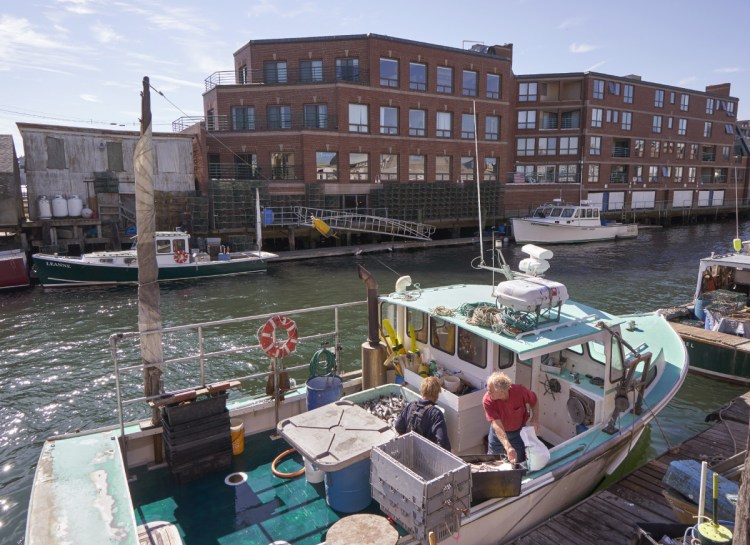The Portland City Council voted unanimously Monday to enact a six-month moratorium on development along its working waterfront – a move meant to bide time to address long-simmering tensions between fishermen and developers.
City Manager Jon Jennings, who sponsored the moratorium, said he will convene a task force of about 11 people in the coming days to address myriad issues affecting the waterfront – from zoning to traffic to enforcing current rules. He also suggested the city look at granting tax breaks to pier owners who improve their piers.
“It’s time we get this right,” said Jennings, who suggested that the group could begin meeting next week. “There’s some urgency to this.”
The moratorium, which will expire June 15, was supported by both pier owners and fishermen, who have been collecting signatures for a citizen referendum that, if enacted, would block non-marine construction on the city’s piers for five years.
“I’m in favor of the moratorium. It’s a great time for people to cool off and think about this,” said Roger Hale, a pier owner who operates a construction business.
Fishermen, who were unnerved by a proposal by developer David Bateman to build a hotel on the waterfront at Fisherman’s Wharf, also supported the moratorium. Several referendum supporters, however, noted that the working waterfront group had written to Jennings, the mayor and councilors in September proposing a moratorium, but did not receive a response.
That changed after they began collecting signatures.
“Nobody wanted a referendum, but it seemed the only way to force the city to address the negative impacts of non-marine development on the working waterfront,” said Willis Spear, a lobsterman who has fished out of Portland for the last 50 years. “It was born out of frustration.”
After the meeting, Spear said the group will continue collecting signatures for the referendum and decide later when and if to move forward.
The group has until Jan. 18 to submit at least 1,500 signatures for the current proposal. But the group, which set a 2,500-signature goal, could launch another effort in six months if progress isn’t made, said Orlando Delogu, who is helping with the referendum effort.
During the moratorium, the city will not accept or process a range of planning and building applications for the Waterfront Central Zone, which runs from the Maine State Pier to the International Marine Terminal. That includes new applications and existing applications, unless a substantive review of the latter already has been undertaken. The only exception would be to address immediate public safety threats.
City staff will work with a yet-to-be-named task force of waterfront stakeholders in meetings open to the public to look at zoning, transportation, berthing, ordinance enforcement, wharf access and possible public investments in the working waterfront.
Any recommended changes to the Waterfront Central Zone text would be forwarded to the Planning Board, which would provide a recommendation to the City Council.
The moratorium also will allow time for waterfront interests to be represented during the process of creating a Commercial Street Operations and Master Plan. A memo to the council says that staff from planning, economic development and public works will guide the study consultants to “respect the marine use priority.”
With respect to berthing, the city’s Economic Development Department is expected to monitor commercial berthing. If demand exceeds supply, the matter would be brought forward to the City Council, which would be tasked with finding additional space at private and public facilities.
The city also will investigate and enforce an ordinance provision that limits and prohibits expansion of commercial parking for off-site, non-marine uses within the Waterfront Central Zone.
The city wants to avoid a successful referendum that would cement strict zoning rules for five years and deal with lingering concerns about the Waterfront Central Zone. The zone was created in the 1990s to protect the working waterfront from an incursion of condominiums and other construction, but was amended eight years ago to allow more commercial development.
The council loosened restrictions in the zone during the recession as a way for pier owners to generate money for costly repairs to their wharves. Charlie Poole, who owns Union Wharf, said he recently spent $1.8 million to rebuild a 210-foot section of wharf.
Mayor Ethan Strimling said he hoped that pier owners would be willing to find ways to compromise.
“I just ask that, as this task force moves forward, all of you think about ways you can compromise for the greater good,” Strimling said. “This is going to be hard.”
City Councilor Belinda Ray, who represents the Waterfront Central Zone, said she’s hopeful about the outcome. She noted this is the third moratorium in her district to address development concerns in the last two years.
“That is a testament to the fact that we’re booming and we need to make sure we’re booming with balance,” Ray said. “And if we lose that balance, we lose a lot of what has brought so many of us here to Portland.”
Randy Billings can be contacted at 791-6346 or at:
rbillings@pressherald.com
Twitter: randybillings
Send questions/comments to the editors.




Success. Please wait for the page to reload. If the page does not reload within 5 seconds, please refresh the page.
Enter your email and password to access comments.
Hi, to comment on stories you must . This profile is in addition to your subscription and website login.
Already have a commenting profile? .
Invalid username/password.
Please check your email to confirm and complete your registration.
Only subscribers are eligible to post comments. Please subscribe or login first for digital access. Here’s why.
Use the form below to reset your password. When you've submitted your account email, we will send an email with a reset code.